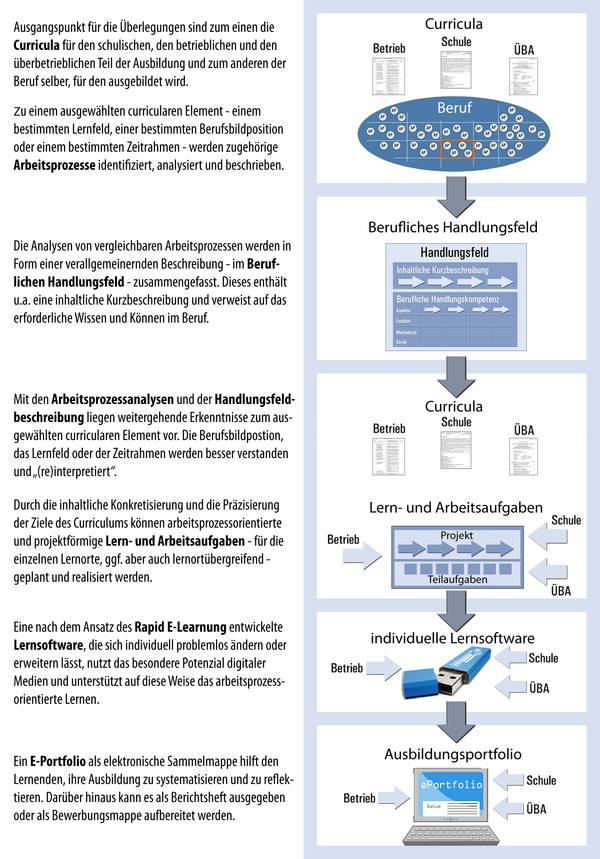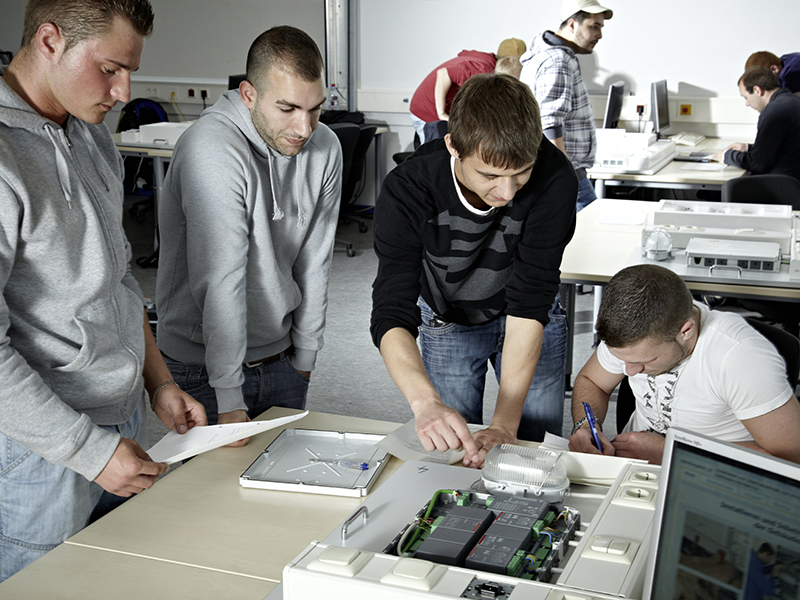Abteilung Prof. Dr. Howe
- Abteilungsleitung
- Prof. Dr. Falk Howe
- Stellvertretende Abteilungsleitung
- N. N.
- Sekretariat
- Brigitte Schweckendieck
Leitkonzept
Die Anwendungsbereiche der Forschungs- und Entwicklungsarbeiten der Abteilung sind die Elektrotechnik, die Informationstechnik und die Gebäudetechnik. Besondere Schwerpunkte bilden nachhaltige Energiesysteme und Energieeffizienz. Grundlagen sind hierbei berufswissenschaftliche Forschungsergebnisse zur Identifikation von Kompetenzen in Arbeitsprozessen, fachdidaktische Ansätze zur Erschließung von Bildungs- und Qualifizierungspotenzialen von Arbeit und Technik sowie Erkenntnisse der anwendergerechten Entwicklung und Nutzung innovativer Medien.
Die Kompetenzwerkst@tt
Handlungsleitend für die Abteilung »Arbeitsorientierte Bildungsprozesse« ist das berufswissenschaftlich begründete Konzept der Kompetenzwerkst@tt. Es bietet Lehrern und Ausbildern im gewerblich-technischen Bereich berufspädagogisch fundierte Impulse und Instrumente zur Gestaltung arbeitsprozessorientierten, softwaregestützten Lernens und Lehrens.
Die Kompetenzwerkst@tt hat sich in verschiedenen Projekten bewährt. Sie ist modifizierbar und lässt sich in der gewerblich-technischen Berufsbildung und der arbeitsorientierten Allgemeinbildung einsetzen. Anwendungsfelder bieten sich in der Berufsorientierung, in der Berufsvorbereitung, in der schulischen, betrieblichen und überbetrieblichen Erstausbildung sowie in der Fort- und Weiterbildung.

Forschung
Berufswissenschaftliche Qualifikationsforschung
Ergebnisse berufswissenschaftlicher Qualifikationsforschung bilden die Basis für weitergehende Entwicklungsarbeiten der Abteilung. Die wichtigsten Instrumente sind Sektoranalysen, Fallstudien, Expertenworkshops und Arbeitsprozessanalysen. Mit Hilfe der gewonnenen Erkenntnisse lassen sich Bildungsgänge planen, Curricula entwickeln, Bildungs- und Qualifizierungsprozesse gestalten und Medien konzipieren.
 Fachdidaktische Forschung
Fachdidaktische Forschung
Die fachdidaktische Forschung der Abteilung beschäftigt sich mit
den Fragen der lernförderlichen Gestaltung sowie der Wirksamkeit von
Bildungs- und Qualifizierungsprozessen. Als Ziel beruflicher Bildung
wird dabei die Förderung einer umfassenden beruflichen
Handlungskompetenz ausgewiesen; die Lernenden sollen in die Lage
versetzt werden, Arbeitswelt und Gesellschaft in sozialer und
ökologischer Verantwortung mitzugestalten. Arbeitsorientierte Bildung
reicht mit diesem Anspruch also deutlich über die Qualifizierung im
Sinne der Bewältigung von Arbeitsprozessen hinaus.![]()
Medienentwicklung / (Rapid) E-Learning
Die Gestaltung von Lernumgebungen besitzt für arbeitsorientiertes Lernen eine besondere Bedeutung. Eine Schlüsselrolle in den Forschungsarbeiten der Abteilung nehmen hier digitale Medien ein. Mit deren Einsatz lassen sich Arbeitsprozesse visualisieren, komplexe Themen strukturieren, unzugängliche Sachverhalte veranschaulichen, Aufgaben authentisch illustrieren usw. Der Entwicklungsschwerpunkt orientiert sich an der Idee des Rapid E-Learning: Die nach diesem Ansatz konzipierte Lernsoftware sieht vor, dass die Anwender selbst ohne besonderes medientechnisches Know-how und ohne besondere technische Ausstattung problemlos neue Inhalte erstellen und bestehende Inhalte anpassen können.
Mitglieder der Abteilung
-
- Raum
- 2.32
- Telefon (Büro)
- +49 421 218-66306
- h.auffarth@uni-bremen.de
-
- Raum
- 2.29
- Telefon (Büro)
- +49 421 218-66289
- fenzl@uni-bremen.de
-
- Raum
- 2.39
- Telefon (Büro)
- +49 421 218-66311
- harberts@uni-bremen.de
-
- Raum
- 2.33
- Telefon (Büro)
- +49 421 218-66300
- howe@uni-bremen.de
-
- Raum
- 2.02
- Telefon (Büro)
- +49 421 218-66304
- lmeyne@uni-bremen.de
-
N. N.
-
- mrein@uni-bremen.de
-
- Raum
- 2.28
- Telefon (Büro)
- +49 421 218-66294
- mreinsberg@uni-bremen.de
-
- Raum
- 1.10
- kruth@uni-bremen.de
-
- Raum
- 2.32
- Telefon (Büro)
- +49 421 218-66344
- asaniter@uni-bremen.de
-
- Raum
- 2.43
- Telefon (Büro)
- +49 421 218-66337
- schall@uni-bremen.de
-
- Raum
- 2.34
- Telefon (Büro)
- +49 421 218-66301
- brigitte.schweckendieck@uni-bremen.de
-
- Raum
- 2.08
- Telefon (Büro)
- +49 421 218-66302
- staden@uni-bremen.de
-
- Raum
- 2.29
- Telefon (Büro)
- +49 421 218-66273
- weinowski@uni-bremen.de
Projekte
-
Mission ICH x Future-Box – Entwicklung und Erprobung eines E-Portfolio-Konzepts für die Berufsorientierung in Mecklenburg-Vorpommern auf Grundlage von ‚Mission ICH‘Laufzeit 01. September 2025 bis 31. August 2026Prof. Dr. Falk Howe , Dr. Melanie Schall , Dr. Christian StadenDas Projekt entwickelt und erprobt ein digitales E-Portfolio-Konzept zur Berufsorientierung auf Grundlage der Future-Box, das an die Rahmenbedingungen Mecklenburg-Vorpommerns und das Landesprogramm Mission ICH angepasst wird. Ziel ist die Förderung selbstgesteuerter Lernprozesse, die Qualifizierung von Lehrkräften sowie die Vorbereitung einer landesweiten Implementierung ab dem Schuljahr 2026/2027.
-
VETAssIst – Artificial Intelligence as VET Teacher AssistantLaufzeit 01. November 2024 bis 30. April 2027Vivian Harberts , Prof. Dr. Falk Howe , Dr. Andreas SaniterDas Projekt „Artificial Intelligence as VET Teacher Assistant“ (VETAssIst) wird unterstützt durch die Erasmus+ Förderschiene KA220-VET. Unser Ziel ist es, die Berufsbildung weiterzuentwickeln, indem wir das transformative Potenzial von Künstlicher Intelligenz (KI) in die tägliche Arbeit von Berufsbildungslehrpersonen integrieren.
-
ISOV – Innovative Skills for an Old VocationLaufzeit 01. November 2024 bis 31. Oktober 2027Jenni Gaa , Prof. Dr. Falk Howe , Dr. Andreas SaniterWie alle Branchen wird auch die industrielle Schuhproduktion mit den Megatrends Globalisierung, Digitalisierung und Nachhaltigkeit konfrontiert. Arbeitsprozesse verändern sich – daher müssen sich sowohl die Ausbildung als auch die Weiterbildung auch verändern.
-
CESynergy – Circular Economy Pathways for the Energy TransitionLaufzeit 01. September 2024 bis 30. August 2027Vivian Harberts , Prof. Dr. Falk Howe , Myrthe Reinsberg , Dr. Andreas Saniter , Julia TietjenHerausforderungen des Energiewandels - - - Der Energiesektor befindet sich an einem kritischen Punkt: Die Stromversorgungssysteme tragen maßgeblich zu den Treibhausgasemissionen und der globalen Erwärmung bei. Bei der Umstellung der Energieversorgung von fossilen Brennstoffen auf erneuerbare Energiequellen müssen nicht nur die technologischen und ökologischen Aspekte berücksichtigt werden, sondern auch die erforderlichen materiellen Ressourcen.
-
FLAME – Feuerwehr-Laufbahnausbildung modern und effizientLaufzeit 01. Januar 2024 bis 31. Dezember 2026Dr. Claudia Fenzl , Prof. Dr. Falk Howe , Lisa Meyne , Nils WeinowskiIm Projekt „Feuerwehr-Laufbahnausbildung modern und effizient“ (FLAME) unterstützt das ITB die Feuerwehrakademie Hamburg bei der Modernisierung und Erweiterung ihrer beamtenrechtlichen Laufbahnausbildung.
-
FUESE – Fortalecimiento de la Extensión en el Ecosistema Social de las universidades en Centro AméricaLaufzeit 01. Januar 2024 bis 31. Dezember 2026Vivian Harberts , Prof. Dr. Falk HoweIn den letzten Jahren haben Universitäten in Zentralamerika infolge der Globalisierung, der Entwicklung zur Wissensgesellschaft und den Fortschritten in Informations- und Kommunikationstechnologien tiefgreifende Veränderungen erfahren. Diese betreffen insbesondere ihre Aufgaben, ihre Leitung und ihre soziale Rolle. Das Projekt FUESE zielt darauf ab, die universitäre Weiterbildung zu modernisieren, indem es die institutionellen Politiken und Praktiken reformiert, um deren Einfluss auf das sozioökonomische Umfeld in der Region zu stärken. Das Projekt wird in drei Phasen umgesetzt, wobei alle Partner in Diagnose, Planung, Umsetzung, Bewertung und Institutionalisierung eines neuen Modells involviert sind, das die Effektivität der universitären Weiterbildung verbessern soll.
-
DEVISE4KE – Stärkung der nachhaltigen Entwicklung der beruflichen Bildung in Kenia durch die Integration von arbeitsplatzbasiertem Lernen und der Verbesserung der ICT-Kompetenzen von Lehrkräften und Schüler:innen durch Verwendung von Solarenergie und energieeffizienten GerätenLaufzeit 01. Dezember 2023 bis 30. November 2026Vivian Harberts , Prof. Dr. Falk Howe , Peter Kaune , Dr. Christian StadenIn DEVISE4KE werden drei weiterführende Schulen mit Berufsbildungsklassen mit Photovoltaik-Anlagen sowie Niedrigenergie-IT-Geräten in einer ländlichen Region in Kenia ausgestattet. Durch diese Maßnahmen sowie Lehr-Lernaktivitäten für Lehrkräfte soll digital-gestütztes und arbeitsbasiertes Lernen den Schüler:innen vor Ort ermöglicht werden.
-
MULE – Multimedia Learning Environment for Work-Based Learning Tasks for VET-Students in the Sector of Applied InformaticsLaufzeit 01. November 2023 bis 31. Oktober 2026Vivian Harberts , Prof. Dr. Falk Howe , Peter Kaune , Dr. Christine SiemerDas Projekt MULE zielt darauf ab, aktuelle Trends in der angewandten Informatik durch die Zusammenarbeit zwischen Berufsschulen, Universitäten und der Industrie verstärkt in Lehrpläne zu integrieren. Dies soll durch die Ermittlung von "beruflichen Handlungsfeldern" als Grundlage für Lern- und Arbeitsaufgaben in einer multimedialen Lernumgebung erreicht werden, wobei der Schwerpunkt auf der Förderung der transversalen und fachlichen Kompetenzen der Schüler liegt. Das Projekt beabsichtigt auch, die Vergleichbarkeit, Transparenz und Anerkennung der beruflichen Kompetenzen von Fachleuten der angewandten Informatik aus Deutschland, Serbien, Italien und Spanien durch einen transnationalen Sektorqualifikationsrahmen (SQF) zu verbessern.
-
AI4Ed – AI strategy in educational processesLaufzeit 01. Dezember 2022 bis 31. Mai 2025Vivian Harberts , Prof. Dr. Falk Howe , Peter Kaune , Dr. Andreas SaniterAI4Ed zielt darauf ab, aktuelle Lehr-Lern-Prozesse zu hinterfragen und wird neuartige Technologien (KI) und Pädagogik einbeziehen und damit experimentieren, um Werkzeuge, Methoden und Bewertungssysteme zu entwickeln, die auf die neue Realität reagieren.
-
BIBB-Lernpfade – Betriebliche Ausbildung gestaltenLaufzeit 01. Juni 2022 bis 31. Mai 2025Prof. Dr. Falk Howe , Dr. Melanie Schall , Dr. Christian StadenZiel des Projekts BIBB-Lernpfade ist es, Ausbildungspersonal nachhaltig in seiner beruflichen Handlungskompetenz als Ausbildungsexpertinnen und -experten zu fördern. Im Ergebnis entstehen an den Bedarfen der Zielgruppe orientierte „Lernpfade“, die es dem Ausbildungspersonal - auch individuell zugeschnitten - ermöglichen, ihre Ausbildungsplanungen und -prozesse an den aktuellen Anforderungen ihrer jeweiligen Branche auszurichten. Die konzeptionelle Basis des Weiterbildungsangebots bildet das langjährig etablierte berufswissenschaftliche Konzept der Kompetenzwerkstatt (http://www.kompetenzwerkstatt.net/).
-
Orienta4VET – VET: an attractive and viable pathway. Innovating in VET through guidance processes and exploring flexible and diversified opportunities in VETLaufzeit 28. Februar 2022 bis 28. Februar 2025Vivian Harberts , Prof. Dr. Falk Howe , Myrthe Reinsberg , Dr. Klaus Ruth , Dr. Andreas SaniterDie zweite Lernphase nach Abschluss der Sekundarstufe I ist sowohl für die Fortsetzung der allgemeinen und/oder beruflichen Bildung als auch für eine erfolgreiche Arbeitsmarktintegration unerlässlich (OECD, 2020). Laut OECD gilt Berufsausbildung als ein erfolgreicher Zugang zum Arbeitsmarkt, wobei Länder mit besser entwickelten und konsolidierten Berufsbildungsprogrammen wirksamer bei der Eindämmung von Jugendarbeitslosigkeit sind.
-
tekom_LandBauMT – Technische Kommunikation in Lern- und Arbeitsprozessen der Land- und Baumaschinenmechatroniker*innen im Kontext Industrie 4.0Laufzeit 01. November 2020 bis 30. Juni 2023Vivian Harberts , Prof. Dr. Falk Howe , Nils Petermann , Prof. Dr.-Ing. Maren Petersen , Michael SanderDie fortschreitende Digitalisierung und Vernetzung in der Industrie und im Handwerk verändern zunehmend die Anforderungen und Tätigkeiten im Beruf Land- und Baumaschinenmechatroniker*in. Dazu führen u.a. ein verstärkter Umgang mit Diagnose-, Analyse- und Konstruktionssoftware in der Land- und Baumaschinentechnik, der fortschreitende Einsatz der Hochvolttechnik, die zunehmende Systemvernetzung sowie Augmented-/ Virtual- und Mixed- Reality-Technologien. Die überbetrieblichen Ausbildungsangebote für Auszubildende der Land- und Baumaschinenmechatronik berücksichtigen diesen digitalen Wandel jedoch noch nicht in hinreichendem Maße. Das Projekt „tekom_LandBauMT“ widmet sich diesen Herausforderungen, indem die überbetrieblichen Bildungsmaßnahmen für Land- und Baumaschinenmechatroniker*innen modernisiert werden.
-
Gestaltung eines digital gestützten, arbeitsprozess- und kompetenzorientierten Ausbildungskonzepts in der Isolierer*innen-Ausbildung bei KAEFERLaufzeit 15. September 2020 bis 31. Juli 2024Vivian Harberts , Prof. Dr. Falk Howe , Alexander Seedorf , Dr. Christian StadenGemeinsam mit der KAEFER Industrie GmbH führt das ITB ein Projekt durch, in dem ein digital gestütztes, arbeitsprozessorientiertes und kompetenzförderndes Ausbildungskonzept entwickelt und in der Ausbildungspraxis exemplarisch für die Berufe „Isolier-Facharbeiter*in“ und „Industrie-Isolierer*in“ implementiert wird.
-
DIA-CVET – „Entwicklung innovativer und attraktiver Weiterbildungsprogramme in der industriellen Schuhfertigung“Laufzeit 01. September 2020 bis 31. August 2023Prof. Dr. Falk Howe , Iris Klein , Dr. Klaus Ruth , Dr. Andreas SaniterIn vielen Ländern wie in Rumänien (RO) oder Portugal (PT) wird die berufliche Aus- und Weiterbildung (VET) als zweite Wahl betrachtet; als ein Bildungsweg für diejenigen, die es nicht geschafft haben, einen Zugang zur höheren, universitären, Bildung (HE) zu erreichen. Einer der Hauptgründe für dieses eher schlechte Image der Berufsbildung ist, dass sie oft als "Sackgasse" betrachtet werden muss; wenn man einmal einen "Blue Collar"-Job angefangen hat, gibt es keine oder nur wenige Optionen für Karrieremöglichkeiten durch berufliche Weiterbildung (CVET). Daher sind Tätigkeiten in anspruchsvolleren Handlungsfeldern der Unternehmen wie die Arbeit in den Abteilungen „Qualitätssicherung (QS)“, dem „Design“ oder der „Produktionsplanung“ Kollegen mit einem Bildungshintergrund aus dem Hochschulbereich vorbehalten. Aber selbst in Ländern mit etablierten Weiterbildungsprogrammen wie Deutschland (DE), wo die Qualifikationen eines Industrie- oder Handwerksmeisters oder Technikers landesweit anerkannt sind und ein sehr gutes Image haben, ist der akademische Drift offensichtlich. Ein beunruhigender Indikator für unsere Branche (industrielle Schuhproduktion) ist: In den letzten zwei Jahren konnten die deutschlandweit einzigen Industriemeisterkurse für diesen Beruf (IHK Pfalz) nicht durchgeführt werden – da sich nicht genügend Teilnehmer (bundesweit nur sechs benötigt!) beworben haben.
-
IMMO-TEC - Entwicklung handlungsorientierter und kompetenzbasierter Lehr-/Lernarrangements für die Berufsausbildung von Immobilienkaufleuten im Bereich der Klima- und EnergieeffizienzLaufzeit 01. Juni 2020 bis 31. Dezember 2021Prof. Dr. Falk Howe , Michael SanderDas Projektvorhaben "IMMO-TEC: Entwicklung handlungsorientierter und kompetenzbasierter Lehr-/Lernarrangements für die Berufsausbildung von Immobilienkaufleuten im Bereich der Klima- und Energieeffizienz" ist dem strategischen Zukunftsfeld Raum - Projektfamilie: "Klimagerecht Bauen" zu zuordnen. Für die Bauwirtschaft und damit einhergehend auch für die Immobilienwirtschaft werden zukünftig auf die Region des Rheinischen Reviers bezogen neue Anforderungsprofile im beruflichen Alltag und den damit verbundenen Handlungskompetenzen der Mitarbeiter/-innen notwendig sein.



